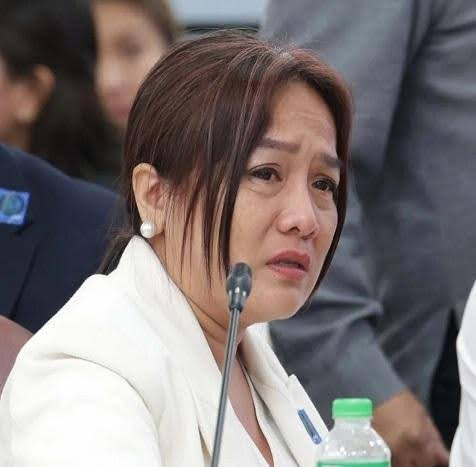A prominent figure of the past Duterte administration melted under the heat of an ongoing congressional probe into the alleged extra-judicial killings in the Philippines, revealing damaging information about the bloody war that pushed the former president, two senators and other major personalities suddenly in the defensive.
Retired police lieutenant colonel Royina Garma, the general manager of the state lottery agency during former president Rodrigo Duterte’s time, told the quad committee of the House of Representatives (QuadCom) that the nationwide drug war from 2016 to 2022 was patterned from the so-called “Davao model” in which deaths of alleged drug personalities could come with a monetary reward that amounted to as much as PHP1-million for every hit.
A police officer of Davao City when Duterte was still its mayor, Garma made the revelation in an emotional testimony before lawmakers who were out to break the mystery behind Duterte’s drug war that left thousands of alleged drug suspects dead.
There have been conflicting estimates as to how many actually died during the bloody campaign. Police sources placed the count at around 6,000 deaths while human rights advocates claim the total number of victims could be between 20,000 to 30,000.
The International Criminal Court (ICC) is investigating these deaths, separate from the domestic probes by the House, the Senate, the police and the human rights commission.
Garma’s explosive testimony at the House QuadCom, backed by an affidavit, dragged several key Duterte officials; among them former presidential assistant Christopher Go; former Philippine National Police (PNP) Ronald dela Rosa; and former police officer Edilberto Leonardo who has just resigned as commissioner of the National Police Commission (Napolcom).
Go and Dela Rosa, now senators, as Leonardo have flatly denied Garma’s allegations.
Duterte said he would be willing to appear before House QuadCom members on the condition that the questions thrown at him would be “educated” and “not stupid.”
His lawyer, former presidential legal counsel Salvador Panelo, belittled Garma’s testimony on October 10. “The alleged meeting between her and FPRRD (former President Rodrigo Roa Duterte) was in May 2016. FPRRD assumed office as President only in July 2016. The so-called Davao model of payment and rewards is pure imagination or fertile speculation,” the lawyer posted in his social media account on October 11.
According to Garma’s depositions, she was summoned by then president-elect Duterte to his Davao City home and instructed her to recommend a police officer or a member of the influential Iglesia ni Cristo church who could implement the Davao drug war model on a national scale. The local model has been associated with the shadowy Davao Death Squad (DDS) that emerged when Duterte ruled Davao City for decades.
In Duterte’s purported discussion with Garma, the name of then Lt. Col. Leonardo surfaced and he was soon appointed as Davao regional chief of the PNP Criminal Investigation and Detection Group (CIDG). He was later appointed by Duterte as undersecretary of the Department of Environment and Natural Resources (DENR) until he was given a seat in the Napolcom.
Garma, on the other hand, built her police career in Davao City until she won the plum police post in Cebu City Police Office when Duterte became president. She later opted for voluntary retirement in the PNP to pave the way for her appointment to the juicy post of general manager in the Philippine Charity Sweepstakes Office (PCSO).
Garma alleged in her testimonies that as designated point man of the national drug war, Leonardo conducted briefings for members of the PDEA (Philippine Drug Enforcement Group), IG (intelligence groups), and PNP top officials led by then PNP director general Dela Rosa. She said she and Leonardo were then coordinating mostly with Go, the Palace official known to be closest to Duterte.
The drug war, according to Garma, was a well-funded operation under Leonardo and Go. Its surveillance, implementation and reward payment received substantial funding from a still mysterious source.
The monetary reward, ranging from PHP20,000 to PHP1-million, would be for every drug war casualty. “There were certain amounts given from what I understand, starting PHP20,000 to PHP1 million but I am not familiar with the bracketing,” Garma said during her tearful revelation.
































